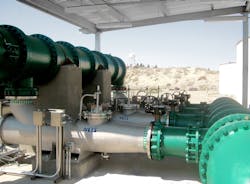Neptune Benson System Receives NWRI Conditional Acceptance
Neptune Benson has announced that its closed vessel ETS-UV system has received conditional acceptance from the California State Water Resources Control Board. The unit approved is an 800 watt, low pressure, high output, closed vessel ultraviolet (UV) system designed for high level reuse water disinfection.
The family of UV systems was third-party tested at a wastewater facility in California in accordance with the Ultraviolet Disinfection Guidelines for Water Reuse Third Edition (National Water Research Institute / Water Research Foundation, August 2012). The units were designed and performance optimized using a variety of CFD emulation tools. The National Water Research Institute (NWRI) standard allows municipal wastewater to be treated and reused for such applications as: irrigation, dust suppression and urinal flushing.
“We are delighted with this approval,” said Neptune Benson CEO Ken Rodi. “We feel we now have the most energy efficient amalgam UV system on the market today. This is important for overall life cost as well as system performance. We look forward to playing an important role in providing safe, reliable and economically sustainable water supplies.”
Source: Neptune Benson
